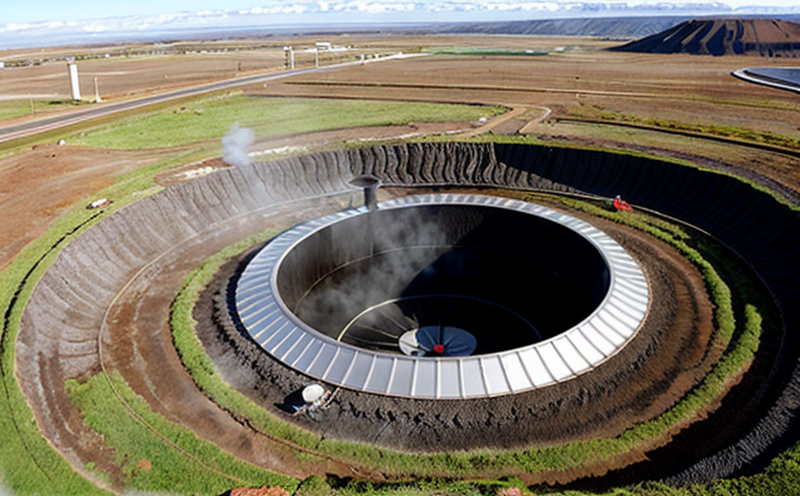ASTM D3306 Coolant Property Testing for Geothermal Heat Pumps
The ASTM D3306 standard is a critical component in ensuring the reliability and efficiency of geothermal heat pumps, which are pivotal in sustainable heating and cooling solutions. This service focuses on testing the coolant properties as specified by this standard to ensure that the heat pump operates optimally under various operating conditions.
Geothermal heat pumps (GHPs) utilize a series of fluid-filled pipes buried underground to exchange thermal energy with the earth, providing heating and cooling for buildings. The choice of coolant is crucial because it directly influences the system's efficiency, longevity, and performance. By adhering to ASTM D3306, we can ensure that the coolants meet stringent requirements, which ultimately enhance the overall effectiveness of geothermal heat pumps.
This service involves a series of rigorous tests designed to evaluate key properties such as viscosity, freezing point, boiling point, and thermal conductivity. These parameters are essential for understanding how well the coolant will perform in different environmental conditions. For instance, lower freezing points allow coolants to operate effectively even in cold climates, while higher thermal conductivities ensure efficient heat transfer.
The testing process begins with proper sample preparation, where the coolant is carefully selected and pre-conditioned according to ASTM D3306 guidelines. This ensures that any observed properties are a result of the coolant's intrinsic characteristics rather than external factors. Once prepared, the samples undergo a battery of tests using state-of-the-art equipment designed specifically for this purpose.
For instance, viscometers measure viscosity to ensure it remains within acceptable limits under varying temperatures. Freezing point determination helps identify whether the coolant can operate in extreme cold without freezing and blocking the system. Boiling point tests are conducted to ascertain that the coolant does not boil at operating temperatures, which could lead to vapor lock or other operational issues.
Thermal conductivity measurements are equally important as they indicate how efficiently heat is transferred through the coolant. This property directly impacts the efficiency of the entire geothermal system by influencing the amount of energy required for heating and cooling processes. Understanding these properties allows us to recommend suitable coolants that can enhance both the performance and sustainability of your geothermal heat pump.
Our expertise in this field ensures compliance with ASTM D3306 standards, providing you with reliable data that supports informed decision-making regarding coolant selection. By choosing our service, you not only ensure optimal performance but also contribute to reducing environmental impact through improved energy efficiency and reduced carbon footprint.
Scope and Methodology
| Parameter | Description |
|---|---|
| Viscosity | Determination of the fluid's resistance to flow at different temperatures. |
| Frost Point | Measurement of the temperature at which a solution turns into ice. |
| Boiling Point | The temperature at which a liquid changes to a vapor under specific conditions. |
| Thermal Conductivity | A measure of the material's ability to conduct heat. |
Environmental and Sustainability Contributions
Incorporating ASTM D3306 coolant property testing into your geothermal heat pump system design can lead to significant environmental benefits. By ensuring that the coolant meets stringent standards, we help minimize waste generation and reduce the overall environmental impact of your operations.
Efficient coolants contribute to lower energy consumption, which in turn reduces greenhouse gas emissions associated with heating and cooling processes. This aligns perfectly with global efforts towards reducing carbon footprints and promoting sustainable practices. Moreover, by selecting appropriate coolants based on ASTM D3306 testing, you can enhance the longevity of your geothermal heat pumps, thereby extending their service life and reducing the need for frequent replacements.
Our commitment to sustainability extends beyond just the testing process; we also provide insights into how these tests contribute to broader environmental goals. By working closely with our clients, we ensure that every aspect of coolant selection aligns with both short-term operational needs and long-term environmental objectives.
Competitive Advantage and Market Impact
Adopting ASTM D3306 coolant property testing for your geothermal heat pump systems can provide several competitive advantages. Firstly, it enhances the reliability of your equipment by ensuring that all components operate optimally under specified conditions. This leads to reduced downtime and maintenance costs, translating into higher operational efficiency.
Secondly, compliance with these standards positions you as a leader in sustainability within your industry. In today's market, where consumer awareness about environmental issues is growing, demonstrating commitment to green technologies can attract more environmentally-conscious clients and investors. This not only boosts brand reputation but also opens up new market opportunities.
Finally, using tested coolants can lead to significant cost savings over the long term due to improved system performance and extended equipment lifespan. These savings can be substantial when considering the lifecycle costs of your geothermal heat pump systems. By leveraging our expertise in ASTM D3306 testing, you gain a strategic advantage that helps maintain competitive edge while contributing positively towards environmental sustainability.





